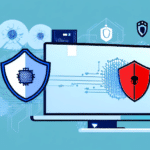Understanding Ransomware Attacks
Ransomware attacks are a prevalent form of cybercrime where malicious actors infiltrate a company's computer systems to encrypt critical data, making it inaccessible to the organization. These attackers then demand a ransom payment in exchange for the decryption key needed to restore access to the data. Typically orchestrated by organized crime groups, ransomware attacks utilize specialized software and advanced techniques to breach a company's defenses.
How Ransomware Works
Once the ransomware gains access to a company's network, it systematically encrypts files and systems, effectively crippling the organization’s operations. The attackers usually provide a deadline for the ransom payment, threatening to permanently delete or publicly release the encrypted data if their demands are not met.
Common Methods of Attack
- Phishing Emails: These deceptive emails appear to come from trusted sources and contain malicious links or attachments that install ransomware upon being clicked.
- Software Vulnerabilities: Exploiting weaknesses in software or operating systems allows hackers to gain unauthorized access and deploy ransomware.
- Remote Desktop Protocol (RDP) Exploits: Unsecured RDP connections can be targeted to infiltrate systems and install ransomware.
FedEx Ship Manager Ransomware Attack Overview
FedEx Ship Manager is a widely used online shipping platform that enables customers to manage shipments and track packages efficiently. Recently, FedEx Ship Manager was targeted by a sophisticated ransomware attack, severely disrupting the company’s ability to process shipments and causing significant delays for customers globally.
Impact on Operations and Customers
The ransomware attack on FedEx led to the theft of sensitive customer data, including names, addresses, and credit card information. This breach not only resulted in financial losses but also damaged FedEx’s reputation, causing customers to lose trust in the platform's security measures. According to a report by Cybersecurity Ventures, ransomware damages are predicted to cost businesses over $20 billion by 2025.
FedEx's Response and Mitigation Strategies
In response to the ransomware attack, FedEx took immediate action to minimize the damage and restore normal operations. The company temporarily took its systems offline to prevent further infiltration and initiated a comprehensive investigation in collaboration with leading cybersecurity firms.
Immediate Response Efforts
- System Shutdown: FedEx swiftly disconnected affected systems from the network to contain the spread of ransomware.
- Engagement with Cybersecurity Experts: Partnering with specialized firms allowed FedEx to identify the breach's origin and scope.
- Customer Communication: FedEx proactively informed customers about the attack and provided support to address concerns related to data security.
Long-term Security Enhancements
To prevent future incidents, FedEx has invested heavily in advanced cybersecurity technologies, including endpoint protection and intrusion detection systems. Additionally, the company has expanded its employee training programs to enhance awareness about cybersecurity threats and best practices.
Preventing Ransomware: Best Practices for Businesses
Businesses can implement a variety of strategies to protect themselves from ransomware attacks. These measures not only safeguard data but also ensure business continuity in the face of cyber threats.
Employee Training and Awareness
Regular training sessions educate employees on identifying phishing attempts, using strong passwords, and following secure data handling practices. According to the CyberSecurity Insiders, human error accounts for nearly 95% of cybersecurity breaches.
Data Backup and Access Controls
Maintaining regular backups of critical data ensures that businesses can recover quickly without yielding to ransom demands. Implementing strict access controls limits the number of individuals who can access sensitive information, reducing the attack surface.
The Broader Implications of Ransomware on Businesses
Ransomware poses significant challenges not only to individual companies but also to the broader economic landscape. The financial and operational impacts extend beyond immediate losses, affecting market trust and business ecosystems.
Economic Costs
The economic impact of ransomware is profound. A report by PwC estimates that the global cost of cybercrime could reach $10.5 trillion annually by 2025. These costs include direct losses, regulatory fines, and the expenses associated with recovery and remediation.
Legal Ramifications
Companies affected by ransomware attacks may face legal consequences, including lawsuits from customers and shareholders, as well as regulatory penalties for failing to protect sensitive data adequately. Businesses must understand their legal obligations and ensure compliance with data protection laws such as the GDPR and CCPA.
The Future of Cybersecurity Against Ransomware
As ransomware tactics continue to evolve, so must the strategies to combat them. Forward-thinking businesses are adopting comprehensive cybersecurity frameworks and leveraging emerging technologies to stay ahead of threats.
Cyber Insurance
Cyber insurance policies provide financial protection against the costs associated with ransomware attacks, including ransom payments, legal fees, and system restoration. These policies are becoming increasingly essential as part of a holistic cybersecurity strategy.
Regular Updates and Vigilance
Continuous monitoring and regular updates to cybersecurity measures are critical in defending against ransomware. Businesses must stay informed about the latest threat vectors and adapt their security protocols accordingly to mitigate risks effectively.
Investing in Advanced Technologies
Adopting technologies such as artificial intelligence and machine learning can enhance threat detection capabilities, allowing for quicker identification and response to potential ransomware activities.
Collaborative Efforts
Collaboration between industry stakeholders, cybersecurity experts, and law enforcement agencies is vital in developing robust defenses and reducing the prevalence of ransomware attacks globally.




















